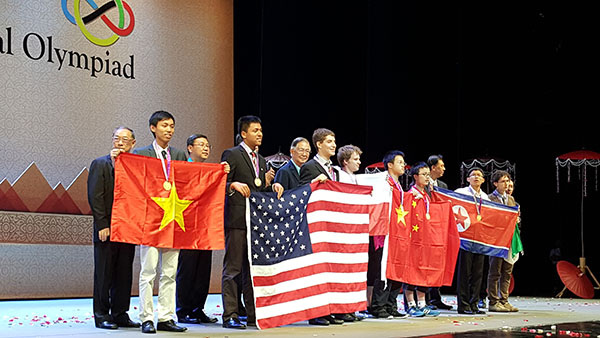
Top teams participated in the International Mathematical Olympiad pose on stage with their national flags on July 15 in Chiang Mai, Thailand. (Provided to China Daily)
Team U.S.A won the first place at this year's International Mathematical Olympiad (IMO) held in Chiang Mai, Thailand, reclaiming the crown after 21 years. The six U.S. high school students defeated teams from 103 countries, including its strongest rival, China, which has won 14 times over the past 20 years.
Po-Shen Loh, head coach of team U.S.A, said technology has done the U.S. its biggest favor.
"Something has changed very much in the last 10 years that may be contributing to the U.S.A ultimately winning this year," said Loh. "Now there is everything you might ever need to learn for free on the Internet."
"China and the U.S. are very much ahead of the rest of the countries, which means our performance was not bad," said Chinese team coach Li Qiusheng. "Although four points behind the U.S., China was 20 points ahead of third-place Korea."
"During recent years, the differences between the strong countries are getting smaller," Li said. "As in international basketball, the American team used to be the winner all the time. But now other countries are catching up, and sometimes beating the U.S.. This doesn't mean U.S. basketball is declining, rather other countries are getting better. I think we can view math competitions the same way."
Unlike regular classroom math problems, competition math goes beyond plugging numbers into formulas. Instead, the questions focus on using what's been learned in school to invent, combine and extend. Creativity is far more important than memorization.
"You never really know what challenge you will face until you open the test," said Zhuoquan "Alex" Song, a member of the Canadian team who was educated in the U.S. and Canada and the only contestant to get a perfect score. It's the hardest kind of competition to prepare for, he added.
Every year, six middle school students are picked from every country through months of exams.
The tournament consists of two tests on two days, each lasting four and a half hours. Students have to solve three problems a day, with each question worth seven points adding up to a 42-point total.
The first questions on each day are the easiest and grow progressively harder. Most years, few students solve the third questions.
According to Yu Chenjie, a veteran competitor on the Chinese team who got second place among 577 students, the hardest questions were more approachable this year while the two mid-level questions were very much harder.
"Our team didn't expect the change of difficulty levels, so we didn't allocate our time very well," Yu said.
Going by the medal count, this was the hardest competition ever, with only 26 students earning gold medals. Last year there were 49 gold metals, and the year before 45.
Jacob Tsimerman, Canadian team coach, said Chinese students have an advantage because their culture sees math as a skill that can be improved with practice, while North Americans too often think of math as a gift you're either born with or not.
"This is a very damaging mindset," said Tsimerman. "It leads people to not try."
He believes everybody can and should do math, and competitions are a good way to promote it.
"It's important for the kids that win. They get noticed, and they get into good universities," he said. "More than that, it encourages high school kids everywhere to get better at math, gives them something to aspire to."
Loh agrees. The main goal of Mathematical Association of America, which organizes team U.S.A for the IMO, he said, "is to promote mathematics throughout America. Sometimes mathematics is presented as a very boring subject, where all you do is memorize formulas."
The purpose of the math contest is "not just to compete, but rather to give students a lot of challenges which are beyond what they normally see in school and introduce them to the kind of mathematics that is creative and fun."


















































